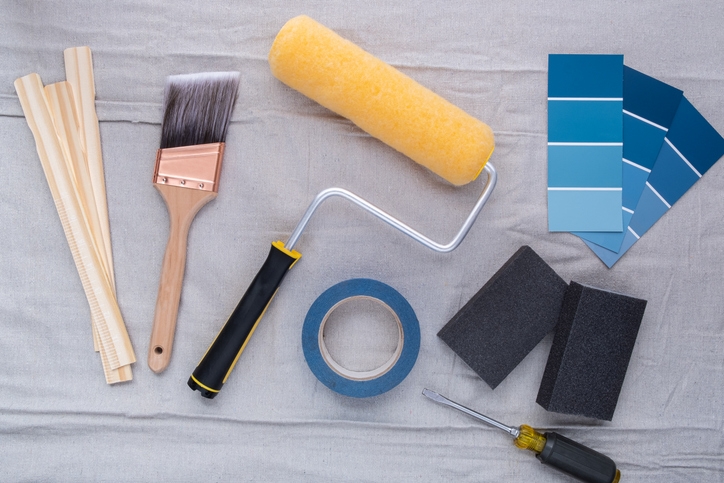For clients, discussing their needs, wants, and goals with their contractors in detail will give the painters a clearer idea of how to approach the job. This level of communication allows the painters to execute the work more efficiently.
However, remaining open to the contractor’s suggestions and recommendations is also important. Their expertise can provide valuable insights that might enhance the overall result of your project. For example, preserve the integrity and appearance of your masonry—find out how our brick waterproofing process works. Remember, they are professionals with experience in this field.
Asking commercial painters the right questions is a key part of effective communication. Here are some of the most important questions clients should ask when considering commercial painters:
1. How many years of experience do you have in commercial painting?
Experience is a vital indicator of a painter’s skill and reliability. It’s important to gauge how seasoned the painting company is by asking about the number of years they’ve been in the commercial painting business. An experienced painter brings a wealth of knowledge and a proven track record to your project.
When discussing their experience, ask about specific projects they’ve completed similar to yours. For instance, if you own a retail store, you’ll want to know if they have a history of working in commercial retail spaces, which can have unique requirements compared to other types of buildings.
Follow-up Questions:
- Can you provide examples of past projects? This question helps you see tangible evidence of their work. Look for projects that are similar in scope and complexity to yours. Photos, case studies, or even a visit to a past site can provide insight into their capabilities.
- Do you have experience with the specific type of building or surface we have? Different surfaces and building types can require specialized techniques and materials. Whether your project involves high ceilings, unique architectural details, or specific materials like metal or concrete, ensure the painter has handled similar challenges before.
2. Are you fully licensed, insured, and bonded?
It’s essential to ensure that the painting company you hire holds the necessary licenses to operate in Dublin. Proper licensing is a sign of a reputable and professional business. Also, they should have adequate insurance coverage, including liability insurance and worker’s compensation. This protects you from any potential liability in case of accidents, injuries, or damage during the project. Don’t hesitate to ask for copies of their licensing and insurance certificates for your peace of mind.
Follow-up Questions:
- What type of insurance do you carry? Understanding the specifics of their insurance policies helps ensure you’re fully protected. Look for comprehensive coverage that includes both liability and worker’s compensation.
- Can you show proof of your insurance and licenses? Reputable companies should be more than willing to provide proof of their credentials. This documentation verifies that they meet all legal requirements and are prepared to handle any issues that might arise during the project.
3. Can you provide references from recent commercial projects?
Talking to past clients can offer valuable insights into the company’s work quality and reliability. You can learn a lot from the experiences of others who have hired the painting contractor before. Look for online reviews on platforms like Google, Yelp, or industry-specific sites to see what people say about their services.
Also, ask the contractor for a list of references you can contact directly. This firsthand information can help you gauge their professionalism, adherence to timelines, and overall client satisfaction.
Follow-up Questions:
- Can we visit any of your past project sites? If possible, visiting a completed project site can give you a real sense of the contractor’s workmanship and attention to detail. It’s also a great way to see how their work holds up over time.
- What feedback have you received from previous clients? Asking this question helps you understand how the contractor handles feedback and any issues that may arise. Positive testimonials can reassure you about their capabilities, while their response to any negative feedback can provide insight into their customer service and problem-solving skills.
4. What is your estimated timeline for completing this project?
Knowing the estimated timeline for your painting project is important so you can plan and minimize disruptions to your business. A clear timeline helps you coordinate other activities and ensures the project fits your schedule.
When discussing the timeline, address potential delays and how they will be managed. This proactive approach can help you prepare for any unforeseen circumstances and keep the project on track.
Follow-up Questions:
- What factors could cause delays? Understanding what might slow down the project, such as weather conditions, supply chain issues, or unexpected repairs, helps you set realistic expectations and plan for contingencies.
- How do you handle unexpected issues that may extend the project timeline? Ask the contractor about their strategy for dealing with surprises. A professional company will have a plan to handle issues promptly and keep you informed throughout the process.
5. Can you provide a detailed written estimate?
Getting a detailed written estimate is essential so you can budget your commercial painting project. The estimate should break down all costs, including labor, materials, and any other expenses. This transparency helps you understand exactly what you’re paying for and allows you to compare quotes from different contractors to ensure you’re getting a competitive rate. Don’t forget to ask about the payment schedule and be aware of any hidden costs that might arise during the project.
Follow-up Questions:
- Are there any potential additional costs we should be aware of? It’s important to know upfront if extra charges could be for unexpected repairs, premium materials, or additional labor. This helps you plan your budget more accurately and avoid surprises.
- What is your policy on change orders? Changes to the project scope can happen, and it’s crucial to understand how these will be managed. Ask about the process for approving and pricing change orders to ensure a clear procedure for handling adjustments without disrupting the budget or timeline.
6. What types of paint and materials do you use?
The quality of the materials used in your painting project impacts the durability and appearance of the finished result. High-quality paints and materials ensure a longer-lasting and more attractive finish.
When discussing this with your painting contractor, ask about the brands and types of paint they recommend and why they prefer them. Understanding their choices can give you confidence in the end product and its longevity.
Follow-up Questions:
- Do you offer eco-friendly or low-VOC paint options? If sustainability is important to you, inquire about eco-friendly or low-VOC (volatile organic compounds) paint options. These paints are better for the environment and improve indoor air quality, which can be especially important in commercial spaces.
- Can you provide samples or examples of your work with these materials? Seeing samples or previous projects using these materials can help you visualize the final outcome. It also gives you a chance to assess the quality and finish of the work, ensuring it meets your standards.
7. How do you prepare the site before painting, and what is your clean-up process?
Proper preparation is key to a long-lasting paint job. Ask your painting contractor about their site preparation methods. This includes how they handle surface preparation, such as cleaning, sanding, and priming, to ensure the paint adheres properly.
Also, ask how they protect your furniture, fixtures, and other areas that won’t be painted. Know their clean-up process to ensure your space is left neat and safe after completing the project.
Follow-up Questions:
- How do you protect your furniture and fixtures during painting? You might use drop cloths, plastic sheeting, and painter’s tape to cover and safeguard your belongings from paint splatters and dust. Knowing these things will give you peace of mind.
- What is your process for handling hazardous materials or waste? Proper disposal of hazardous materials, such as old paint and solvents, is crucial for safety and environmental responsibility. Ask how they manage these materials to ensure they follow regulations and maintain a safe work environment.
8. Do you offer any guarantees or warranties on your work?
A warranty provides peace of mind about the quality and durability of the painting job. It’s essential to understand the terms and conditions of any guarantees, including what is covered and for how long. A good warranty shows that the contractor stands behind their work and is committed to customer satisfaction. Make sure to get all the details in writing to avoid any misunderstandings later on.
Follow-up Questions:
- What does the warranty cover specifically? This question helps clarify the extent of the coverage. Find out if the warranty includes issues like peeling, flaking, or fading. Also, ask if it covers both labor and materials so you know exactly what’s protected.
- How do you handle warranty claims? It’s important to understand the process for making a warranty claim. Ask how to report problems, what the response time is, and how they will resolve issues. A straightforward and efficient claims process indicates a reliable contractor who values customer service.
9. What safety measures do you take during a painting project?
Safety is paramount, especially in commercial settings with more people and activities to consider. It’s important to ask your painting contractor about the safety protocols they follow to protect both their workers and your property. This includes everything from wearing the proper protective gear to securing the work area to prevent accidents.
Follow-up Questions:
- Are your workers trained in safety procedures? Proper safety training is crucial. This training helps prevent accidents and ensures everyone knows how to handle tools and materials safely. Ask if the team has undergone recent safety training and certifications.
- How do you manage hazardous materials and ensure compliance with safety regulations? Handling hazardous materials like paints, solvents, and thinners requires special care. Ask how they store, use, and dispose of these materials to ensure compliance with local safety and environmental regulations. This can prevent potential health risks and environmental damage.
10. Are there any additional services you provide?
Beyond the basic painting services, many companies offer extra services that can add significant value to your project. These additional services might include color consultations, maintenance plans, or even interior decorating. Such services can streamline the entire process, making it more convenient and ensuring a cohesive final look.
Follow-up Questions:
- Do you offer color matching or design advice? If you’re unsure about color choices or design, having access to professional advice can be incredibly helpful. Ask if they provide color-matching services or design consultations to help you choose your space’s best colors and finishes.
- Can you help with ongoing maintenance or future touch-ups? Regular maintenance and touch-ups can keep your space looking fresh and well-maintained. Inquire if the company offers maintenance plans or future touch-up services, which can save you time and hassle down the line.
Conclusion
Asking your commercial painting contractor the right questions can help you ensure a successful and stress-free project. If you want to enhance your commercial property with a fresh coat of paint, Custom Painting, Inc. is here to help. Serving the Bay area including the cities of Lafayette, Livermore, Milpitas, Moraga and Mountain House.
We pride ourselves on our extensive experience, professional credentials, and commitment to quality. Contact us or call us at 925-294-8062 to get started on your next project!



